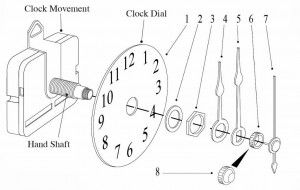Analog clock movements (with clock hands, not digital) don’t just float in the air; they are always attached to something when they are telling time. It can be a traditional wood or metal clock case, or a novelty case such as a sea shell, mounted photo, tennis racquet or 12″ vinyl record. Almost anything. Eventually though, they get old and need to be replaced. It’s pretty easy if you follow our simple instructions.
To remove the clock movement you will need to remove the clock hands first. If you have a second hand, this will normally pull off. Thin needle nosed pliers can be used to pull upward on the back of the second hand near the hub to remove.
The minute hand can either be pressed on the minute hand shaft, or held there by a small round nut (as shown above). If it’s a “press on”, then just pull it off. If there is a small round nut, then hold the minute hand still while turning the small round nut in a counter-clockwise direction until small round nut comes off. Gently pull the minute hand upward to remove.
Almost all hour hands are “press on”, so rock hour hand gently while pulling away from the clock movement. Thin needle nosed pliers can also be used under the hour hand at the hub to assist in removing it.
Now that the clock hands have been removed, it’s time to get the movement out of whatever clock case it is in. Most battery operated clock movements are installed by a system called “Center Fixation”. Some type of nut is threaded onto an exposed threaded metal shaft, or interior threaded shaft, and holds the clock movement in place by tightening the threaded nut. Unfortunately these nuts can vary widely, but they all do the same thing. So regardless of what you have, this nut just needs to be unscrewed. Needle nosed pliers or wrench will work for a hex nut. “Collar nuts” often have either 2 or 4 slots in the top collar that can be “persuaded” by a slotted screwdriver. Sometimes the movement itself can be unscrewed by turning counterclockwise.
Clock movements can also be held in place at the back of the case by using small screws or built in “pressure clips”. In the case of screws, then just unscrew whatever is there. With pressure clips, press both of the clips away from the movement at the same time and the movement should come free. In rare cases a double faced adhesive tape is used. Whatever method is the case, then do your best to undo whatever system may have been used to hold the clock movement in place.
Now that you have the clock movement removed from the case, get yourself a good ruler and start measuring. Replacing a battery operated movement with exactly the same model can be extremely difficult, and not necessary. Please read “First Time Clock Repair” in the Blog section of our web site.
A few careful hand shaft measurements have to be taken to determine what the best part is for you. What we need to know is the overall height of your hand shaft and the thickness of the case material that the hand shaft has to go through. Once you have these measurements you are ready to get a part number for exactly what you need.
If this is not enough help, then have all the clock parts handy, a good ruler, and give us a call at 1-888-827-2387 and input Ext.#300 for Technical Support.




